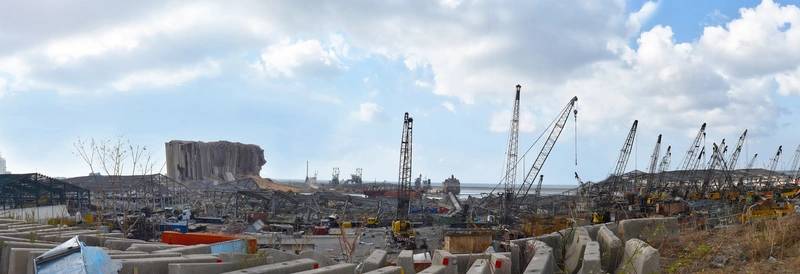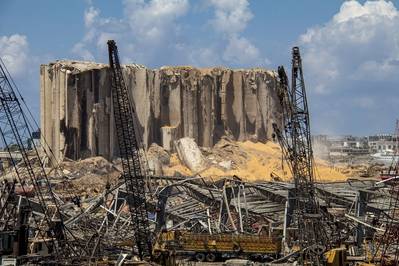Lebanon Asks Interpol to Arrest Ship Captain, Owner Over Beirut Port Blast
Lebanon has asked Interpol to issue arrest warrants for the Russian captain and owner of the ship that brought the explosive material that detonated at Beirut port in August, killing nearly 200 people, state media reported on Thursday.
About two months after the explosion that injured thousands and ravaged the Lebanese capital, questions remain about why and how the cargo was abandoned in Beirut.
Authorities have blamed it on the huge stockpile of ammonium nitrate, used for fertilizer but also for explosives, going up in flames after being stored in poor conditions at the port for years.
There have also been accusations of negligence against Lebanese authorities. Nearly 20 people have been detained in Lebanon after the blast including port and customs officials.
Lebanon's public prosecution asked Interpol to issue warrants to detain the owner and captain, state news agency NNA said on Thursday, without naming them.
- Related: Beirut Blast a Wake-up Call on Dangers of Ammonium Nitrate
- Related: The Beirut Explosion Was Exceptional but Events Leading up to It Were Not
 © Stphanie / Adobe Stock
© Stphanie / Adobe Stock
Boris Prokoshev was captain of the Rhosus ship when it arrived in Beirut in 2013, and he had identified Igor Grechushkin, a Russian businessman in Cyprus, as the owner. A security source and a judicial source said they were the two for whom Lebanon asked for arrest warrants on Thursday.
Russia's national Interpol bureau declined to comment.
Grechushkin, 43, was questioned in Cyprus in August. Attempts by Reuters to reach Grechushkin were unsuccessful.
Cyprus police spokesman Christos Andreou said, regarding an Interpol request on Thursday: "We have not received such a request."
Prokoshev, who is in Russia, said he had not heard anything about it and that he has not been contacted by investigators before.
He has told Reuters that 2,750 tonnes of the chemicals ended up in Beirut after the ship's owner told him to divert to Beirut to pick up extra cargo in 2013. He has also said Lebanese authorities paid little attention to the ammonium nitrate, which had been stacked in the hull in large sacks.
- Related: Who Owned the Chemicals that Blew up Beirut? No One Will Say
- Related: Brokers Calculate Marine Insurance Losses from Beirut Blast
The Rhosus had loaded ammonium nitrate in Georgia, shipping records show, before making the unscheduled stop in Lebanon.
But it never left, becoming tangled in a legal dispute over unpaid port fees and ship defects.
Beirut port authorities impounded the vessel after it arrived in late 2013 due to outstanding debts, according to a state security report which Reuters revealed in August. In 2014, the ship was deemed unseaworthy and its cargo was unloaded in October and warehoused in what was known as Hangar 12, the epicenter of the explosion.
The ship sank near the port's breakwater in February 2018, the report said.
- Related: Beirut's Accidental Cargo: How an Unscheduled Port Visit Led to Disaster
- Related: Beirut Port Explosion Echoes the 1917 Halifax Harbor Blast
(Reporting by Ellen Francis and Laila Bassam, Michele Kambas in Nicosia, Additional reporting by Maria Vasilyeva and Maria Tsvetkova; Editing by Matthew Lewis)















